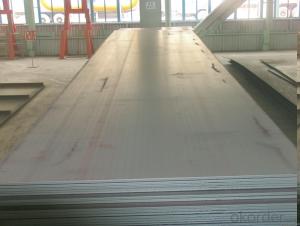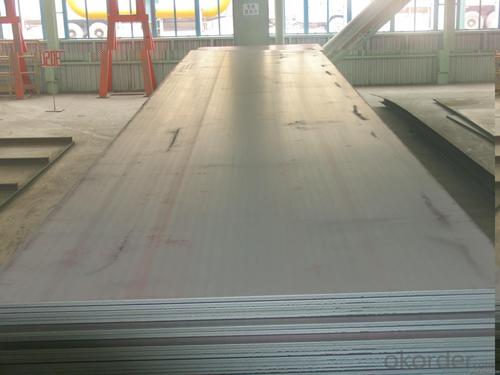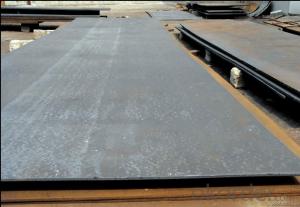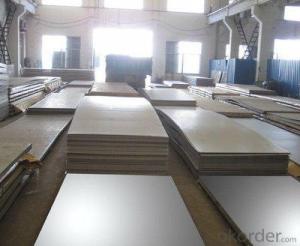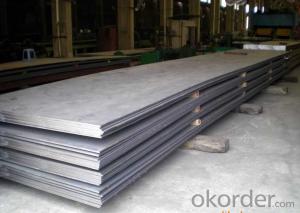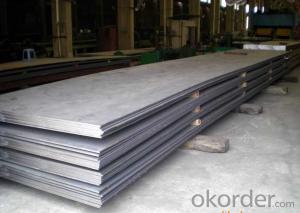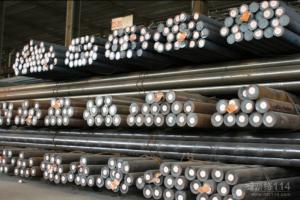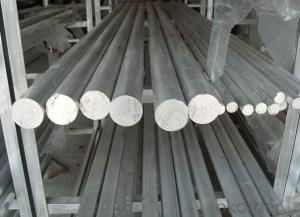Special Steel P20Ni Alloy Steel Plate
- Loading Port:
- China main port
- Payment Terms:
- TT OR LC
- Min Order Qty:
- 25 m.t.
- Supply Capability:
- 10000 m.t./month
OKorder Service Pledge
OKorder Financial Service
You Might Also Like
Specification
Chemical Composition(GB)%
| C | Si | Mn | Cr | Ni | Mo | P | S |
| 0.32-0.40 | 0.20-0.40 | 1.10-1.50 | 1.70-2.00 | 0.85-1.10 | 0.25-0.40 | ≤0.030 | ≤0.030 |
Standard
| GB | ASSAB | DIN | ISO |
| 3Cr2MnNiMo | 718 | 1.2738 | 40CrMnNiMo8-6-4 |
Available Size
| Rolled plate | 12-90mm×610mm×L |
Heat Treatment
| Processing | Temperature ℃ | Hardness |
| Anneal | 690-710 | ≤220HB |
| Quenching | 830-870 | 48-52HRC |
| Tempering | 580-650 | 28-35HRC |
Characterstics
| Characteristics | |||||
| 1.High hardening ability | |||||
| 2.Excellent polishing performance and smoothness |
Applications: Suitable for large size mirror dies,automobile tail lights,domestic electrical applicances,etc


1, Your advantages?
professional products inquiry, products knowledge train (for agents), smooth goods delivery, excellent customer solution proposale
2, Test & Certificate?
SGS test is available, customer inspection before shipping is welcome, third party inspection is no problem
3, Payment Terms?
30% TT as deposit and 70% before delivery.
Irrevocable L/C at sight.
4, Trading Terms?
EXW, FOB, CIF, FFR, CNF
6, After-sale Service?
We provides the services and support you need for every step of our cooperation. We're the business partner you can trust.
For any problem, please kindly contact us at any your convenient time.
We'll reply you in our first priority within 24 hours.
- Q: What are the different automotive grades of special steel?
- There are several different automotive grades of special steel, including stainless steel, high-strength steel, advanced high-strength steel, and ultra-high-strength steel. These grades offer varying levels of corrosion resistance, durability, and strength, making them suitable for different automotive applications.
- Q: How is special steel used in the production of cutting blades?
- Special steel is used in the production of cutting blades due to its exceptional properties, such as high hardness, toughness, and wear resistance. These properties allow the cutting blades to maintain their sharpness and durability even when subjected to intense cutting forces and repeated use. The special steel's composition and heat treatment processes ensure that the cutting blades are capable of withstanding harsh operational conditions, resulting in efficient and precise cutting performance across various industries, including manufacturing, construction, and agriculture.
- Q: Can special steel be used in the production of artistic sculptures?
- Yes, special steel can definitely be used in the production of artistic sculptures. Special steel, which refers to steel alloys that have been specifically designed and manufactured for particular applications, offers a wide range of advantages that make it suitable for creating sculptures. Firstly, special steel alloys provide exceptional strength and durability, allowing sculptors to create large and intricate structures that can withstand external forces and environmental conditions. This strength and resilience is crucial, especially for outdoor sculptures that are exposed to weather elements such as rain, wind, and extreme temperatures. Additionally, special steel alloys offer versatility in terms of shaping and forming. They can be easily molded and manipulated into various shapes and sizes, which allows artists to bring their creative visions to life. Sculptors can utilize different techniques such as welding, cutting, and bending to shape the steel into their desired forms, enabling them to create unique and captivating sculptures. Moreover, special steel alloys can be finished in various ways, such as polishing, painting, or coating, to enhance their aesthetic appeal. This allows artists to add different textures, colors, and surface finishes to their sculptures, further enhancing their artistic value. Furthermore, special steel alloys can also provide resistance to corrosion, which is particularly important for sculptures that are placed in outdoor or humid environments. This corrosion resistance ensures that the sculptures retain their visual appeal and structural integrity over time, reducing the need for frequent maintenance and repairs. In conclusion, special steel offers a wide range of advantages that make it an excellent choice for the production of artistic sculptures. Its strength, versatility, aesthetic appeal, and resistance to corrosion provide artists with the necessary tools to create visually stunning and durable sculptures that can be enjoyed for years to come.
- Q: How does special steel contribute to the manufacturing industry?
- Special steel contributes to the manufacturing industry by providing superior strength, durability, and performance in various applications. Its unique composition and properties allow for the production of high-quality components and machinery that can withstand extreme conditions, ensuring safety and reliability. Additionally, special steel enables manufacturers to create lightweight and efficient products, leading to cost savings and environmental sustainability.
- Q: How does the hardness of special steel affect its performance?
- The hardness of special steel directly affects its performance as it determines its ability to withstand wear, deformation, and damage under various operating conditions. A harder steel will generally have improved resistance to abrasion, impact, and fatigue, making it more suitable for demanding applications where durability and strength are crucial. Additionally, hardness can affect other properties such as machinability, formability, and corrosion resistance, influencing the overall performance and longevity of the special steel in its intended use.
- Q: What are the physical properties of special steel?
- Special steel refers to a broad category of steel alloys that possess unique physical properties compared to regular steel. These properties can vary depending on the specific type of special steel. However, some common physical properties include high strength, hardness, toughness, and resistance to corrosion and wear. Special steels are often tailored for specific applications, such as automotive components, aerospace structures, or toolmaking, to meet the demanding requirements of these industries.
- Q: What are the mechanical properties of special steel?
- Enhanced mechanical properties are possessed by special steels, also known as alloy steels, in comparison to regular carbon steels. These properties differ based on the concentration and specific alloying elements. Some common mechanical properties of special steel are as follows: 1. High tensile strength: Special steels are recognized for their exceptional strength, making them suitable for applications requiring high load-bearing capacity. The tensile strength of these steels can vary from 500 MPa to over 2,000 MPa, depending on the composition. 2. Improved hardness: The inclusion of alloying elements in special steels can significantly increase their hardness. This property is desirable for applications that demand resistance to wear and abrasion. Special steels can achieve hardness levels ranging from 200-600 HB (Brinell hardness), depending on the specific alloy composition and heat treatment. 3. Good toughness: Special steels commonly exhibit good toughness, which refers to their ability to absorb energy before fracturing. This property is crucial for components subjected to impact or dynamic loading. The combination of high strength and toughness makes special steels suitable for demanding applications such as automotive parts or industrial machinery. 4. Excellent fatigue resistance: Special steels are engineered to withstand cyclic loading without failure. They display enhanced fatigue resistance, enabling them to endure repeated stress cycles without compromising their structural integrity. This property makes special steels ideal for critical components in the aerospace, automotive, and machinery industries. 5. Superior corrosion resistance: Depending on the alloy composition, special steels can offer improved corrosion resistance compared to regular carbon steels. The addition of elements like chromium, nickel, or molybdenum aids in the formation of protective oxide layers on the surface, preventing corrosion and increasing durability. 6. High temperature resistance: Certain special steels are specifically formulated to perform well at elevated temperatures. They possess excellent heat resistance and can retain their mechanical properties even under extreme temperatures. This property is crucial for applications such as turbine blades, exhaust systems, or high-temperature furnaces. It is important to note that the specific mechanical properties of special steel can vary significantly depending on the specific alloy composition, heat treatment, and processing techniques employed. Therefore, it is essential to consult the material specifications or seek expert advice to determine the exact mechanical properties of a particular special steel.
- Q: What are the properties of corrosion-resistant stainless tool steel?
- Corrosion-resistant stainless tool steel possesses several properties that make it highly suitable for various applications. Firstly, it exhibits exceptional resistance to corrosion, even in harsh environments, due to the presence of a high percentage of chromium in its composition. This resistance helps prevent the formation of rust, stains, or pitting, ensuring durability and longevity. Additionally, this type of steel maintains its mechanical strength and hardness at elevated temperatures, making it ideal for tools and equipment subjected to high heat or wear. Furthermore, corrosion-resistant stainless tool steel offers excellent machinability, allowing for ease of shaping, cutting, and forming. Its combination of corrosion resistance, strength, and machinability makes it a popular choice for various industries, including manufacturing, construction, and automotive.
- Q: What are the different methods of surface electroplating for special steel?
- There are several methods of surface electroplating for special steel, including electroless plating, electroplating by immersion, barrel plating, and rack plating. Electroless plating is a chemical process that uses a reducing agent to deposit a layer of metal onto the steel surface. Electroplating by immersion involves immersing the steel in an electrolyte bath and applying an electric current to deposit a metal coating. Barrel plating is a method where the steel parts are placed in a rotating barrel along with the plating solution, creating a tumbling action that ensures an even coating. Rack plating involves suspending the steel parts on a rack and immersing them in the plating bath. Each method has its own advantages and is chosen based on the specific requirements and characteristics of the special steel being plated.
- Q: What are the properties of copper alloys?
- Copper alloys have various properties that make them valuable in different applications. They possess high electrical and thermal conductivity, making them suitable for electrical wiring and heat exchangers. Copper alloys also exhibit excellent corrosion resistance, making them ideal for plumbing systems and marine applications. Additionally, they offer good malleability and ductility, allowing for easy shaping and forming. Copper alloys can be further enhanced with the addition of other elements to improve specific properties such as strength, hardness, or resistance to specific environments.
Send your message to us
Special Steel P20Ni Alloy Steel Plate
- Loading Port:
- China main port
- Payment Terms:
- TT OR LC
- Min Order Qty:
- 25 m.t.
- Supply Capability:
- 10000 m.t./month
OKorder Service Pledge
OKorder Financial Service
Similar products
Hot products
Hot Searches
Related keywords
